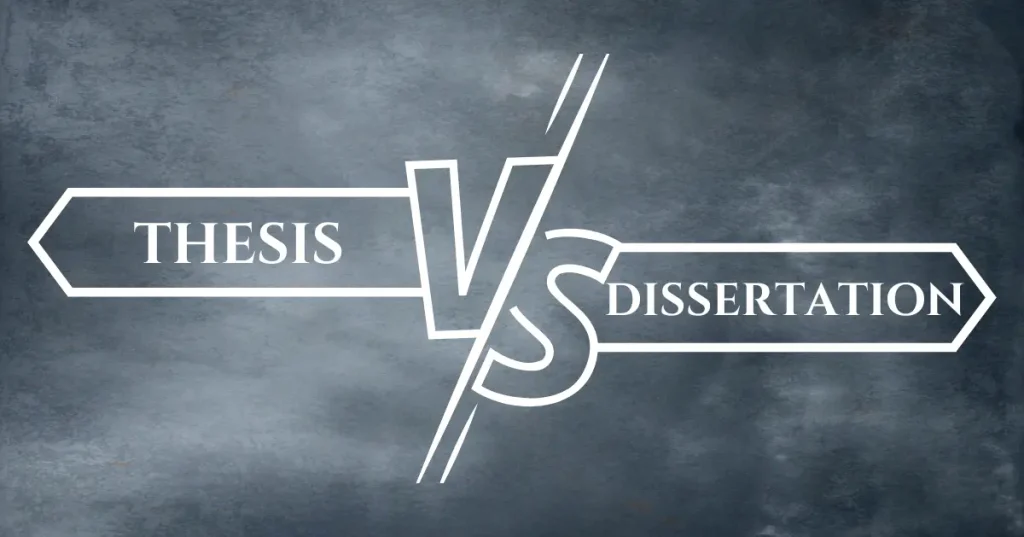Academic writing is key for learning. Knowing the difference between a thesis and a dissertation is vital. These terms are often mixed up, but they mean different things. The main difference is in their purpose and scope.
Academic writing needs a deep grasp of the subject. Research papers are crucial in this journey. The debate on thesis vs dissertation is common among scholars. It’s important to know the main differences.

In academic writing, research papers show a student’s grasp of a subject. The thesis vs dissertation distinction is key. It helps students and researchers meet each document’s specific needs. By understanding these differences, students can excel in academic writing and produce top-notch research papers.
Key Takeaways
- Understanding the differences between a thesis and a dissertation is crucial for academic success
- Research papers are a critical component of academic writing
- The thesis vs dissertation distinction is essential for students and researchers
- Academic writing requires a deep understanding of the subject matter
- Research papers play a significant role in the academic writing process
- The thesis and dissertation have different purposes and scopes
- Understanding the key differences between a thesis and a dissertation can help students produce high-quality research papers
Read More: The Difference Between Online and Offline Education
Understanding Academic Writing Requirements
Academic writing is key in higher education. It’s vital for students to know what’s expected. Academic levels affect how complex and deep the research should be. As students move up, they need to show more knowledge and skill in their subjects.
Research papers are a big part of academic writing. Students must do deep research, analyze data, and share their findings clearly. Research expectations change with each level, with more advanced students needing to do more original work. Academic standards also set the bar for quality and thoroughness.
Important parts of academic writing include:
- Doing thorough research and reviews
- Creating a clear research question
- Gathering and analyzing data
- Sharing findings in a straightforward way
Learn More: The Difference Between Learning vs Education
Knowing these requirements helps students do well in their studies. They can write top-notch research papers that meet academic standards and go beyond research expectations.
What Exactly Is a Thesis?
A thesis is a detailed research paper that shows a student’s skills in deep research, data analysis, and drawing conclusions. Thesis guidelines are strict, covering the research scope and analysis depth. The research depth is key, showing a student’s ability to delve into a topic and add to the knowledge base.
The scope requirements for a thesis differ by institution and field. Generally, a thesis must show a student’s skill in finding research gaps, doing a deep literature review, and analyzing data to answer the research question. Important aspects of a thesis include:
- Original research that adds to the existing knowledge
- A clear and concise research question that guides the investigation
- A thorough literature review that sets the research context
- Methodical data collection and analysis procedures
By following thesis guidelines and doing thorough research, students can create a top-notch thesis. This meets the
Defining the Dissertation
A dissertation is a detailed research project. It shows a student’s skill in original research and adds to their field of study. It’s a key part of many graduate programs, with different needs based on the school and department. It usually includes a literature review and original research that adds to what’s already known.
Understanding the parts of a dissertation is crucial. These parts are:
- Doing a deep literature review to find research gaps
- Creating and using a research method to gather and analyze data
- Sharing and explaining the findings clearly
Expectations for dissertation research are very high. Students must do high-quality, original research that greatly adds to their field. This needs a strong grasp of the subject and the ability to design a solid research plan. Writing a dissertation takes a lot of time, often months to a year or more.
Creating a realistic timeline is key. It should include time for the literature review, data collection, analysis, writing, and revising. Knowing what’s expected helps students succeed and write a top-notch dissertation that meets their school’s standards.
The Main Difference Between Thesis and Dissertation
In academic writing, the terms thesis and dissertation are often mixed up. But they mean different things. Knowing the difference is key for students in higher education. A thesis is for a master’s program, while a dissertation is for a doctoral program.
The main differences are:
- Purpose: A thesis shows a student’s grasp of a field. A dissertation adds new knowledge to it.
- Scope: A thesis is narrower, focusing on a single field aspect. A dissertation is broader, covering more topics.
- Requirements: A thesis needs less research and is shorter than a dissertation.
In research papers, both theses and dissertations need original research and analysis. But the research depth and scope are different. Knowing these differences helps students in their academic path and in writing quality academic writing.
The difference between a thesis and a dissertation is crucial for students. It affects their academic writing and research papers. By understanding each, students can focus their work on their program’s needs and contribute to their field.
| Characteristic | Thesis | Dissertation |
|---|---|---|
| Purpose | Demonstrate understanding | Contribute new knowledge |
| Scope | Narrower | Broader |
| Requirements | Less research, shorter length | More research, longer length |
Research Depth and Scope Requirements
In academic research, research depth and scope requirements are key. They help make the study quality and valid. Original research aims to bring new insights and should have a clear focus.
Researchers start by doing a deep literature review. This helps them find gaps in current knowledge. They analyze studies, spot patterns, and form a research question or hypothesis.
Original Research Expectations
Original research must be thorough, systematic, and open. It involves collecting and analyzing primary data. This can be through surveys, experiments, or observations.
The research design and methods should be clear. The results should be easy to understand.
Literature Review Requirements
A literature review is vital in academic research. It sets the study’s foundation and frames the research question or hypothesis. It should cover a wide range of sources and be well-organized.
Data Collection Methods
Choosing data collection methods is crucial. They should match the research question and study design. Common methods include surveys, interviews, and observations.
These methods should be used to avoid bias. They help ensure the data’s reliability and validity.
- Surveys and questionnaires
- Interviews and focus groups
- Observations and experiments
Length and Structure Variations
When it comes to academic standards, the length and structure of a thesis and a dissertation can vary a lot. A thesis is usually shorter, with a length of 100 to 200 pages. On the other hand, a dissertation can be much longer, often over 300 pages.
Both theses and dissertations have similar parts like an introduction, literature review, methodology, results, and conclusion. But, the dissertation requirements might ask for more detail and chapters. Thesis guidelines might be more flexible, allowing for a shorter and more focused work.

- Thesis: typically shorter, more focused, and concise
- Dissertation: longer, more comprehensive, and detailed
It’s important to understand these differences to meet academic standards and finish a thesis or dissertation. By following the specific dissertation requirements or thesis guidelines, students can make sure their work is well-structured and meets the standards.
Defense Process and Committee Requirements
The final stages of a thesis or dissertation involve a defense. Students present their research to a committee. This can be scary, but knowing what to expect helps. The thesis defense and dissertation defense are similar but have differences.
Choosing a committee is a big step. Students work with their advisor to pick experts in their field. This committee will review the research and offer feedback during the defense. Students need to be ready to talk about their research, how they did it, and what they found.
Thesis Defense Overview
A thesis defense includes a presentation and a Q&A session with the committee. Students must be ready to go into detail about their research. They should also be prepared to answer any questions or concerns the committee has.
Dissertation Defense Protocol
A dissertation defense is similar but might be more formal. It often has a longer Q&A session. Students need to be ready to defend their research and talk about its implications.
Committee Selection Guidelines
When picking a committee, consider a few things:
- Expertise in the field
- Availability and willingness to serve
- Ability to give helpful feedback
Understanding the defense process and committee needs helps students prepare. With good planning and preparation, students can successfully defend their thesis or dissertation. This way, they can reach their academic goals.
| Defense Process | Thesis | Dissertation |
|---|---|---|
| Presentation | Typically 30-60 minutes | Typically 60-90 minutes |
| Question-and-Answer Session | Typically 30-60 minutes | Typically 60-90 minutes |
Time Investment and Planning
Managing your time well is key when working on a thesis or dissertation. You need a plan to meet research expectations and handle the challenges of writing at different academic levels. A good plan helps you allocate enough time for each task. This way, you can finish your project on time and to a high standard.
To manage your time well, break down your project into smaller tasks. This includes doing literature reviews, collecting and analyzing data, and writing your thesis or dissertation. By focusing on the most important tasks and setting achievable deadlines, you can meet your research expectations and create a quality piece of work.
Here are some tips for better time management:
- Make a schedule and stick to it
- Set realistic deadlines and milestones
- Stay focused by avoiding distractions
- Don’t hesitate to ask for help when you need it
By using these tips and being mindful of time management, you can create a top-notch thesis or dissertation. This will help you meet your research expectations and reach your academic goals.

Global Academic Standards
Academic standards vary a lot around the world. Each country and school has its own rules. It’s key for students and researchers to know these international variations when they want to study abroad or work with people from other countries.
In the United States, schools set their own standards. Some are stricter than others. Also, different subjects have their own rules and expectations.
American University Requirements
American schools have their own rules for learning. These rules can change from one school to another. They are shaped by program-specific differences, meaning each subject has its own needs.
International Variations
Standards for learning differ a lot between countries. Some places focus more on theory, while others value practical skills more.
Program-Specific Differences
Different subjects have their own learning standards. Knowing these differences is important for students and researchers. It helps them when they study or work with people from other places.
Understanding academic standards, international variations, and program-specific differences helps students and researchers. It makes it easier for them to navigate higher education and make smart choices about their studies.
Common Mistakes to Avoid
When you’re working on a thesis or dissertation, it’s key to follow thesis guidelines and dissertation requirements. This ensures your work is of high quality. Meeting research expectations is also crucial. It means doing deep research and sharing new findings.
To steer clear of common errors, keep these tips in mind:
- Not understanding the research question or topic
- Failure to conduct thorough literature reviews
- Not meeting the required length and structure
- Insufficient data collection and analysis
- Not following the required citation and referencing style
Knowing these common mistakes helps you avoid them. This way, your thesis or dissertation will meet the standards. Always stick to thesis guidelines and dissertation requirements. Aim to meet research expectations for top-notch academic work.
Conclusion: Making the Right Choice for Your Academic Journey
The difference between a thesis and a dissertation is key for students starting their academic paths. Whether you’re working on a master’s or a doctoral degree, knowing the specific needs of each project is vital. This knowledge is crucial for achieving success.
A thesis is a detailed look into a specific topic. On the other hand, a dissertation is a broader, more in-depth study that adds new insights to a field. The process, timeline, and who you work with also differ a lot between these two academic writings.
When deciding between a thesis or a dissertation, think about what interests you, your research goals, and your future career plans. Talk to your advisors and mentors to make sure you choose the right path for your writing and research papers goals.
The choice you make – thesis vs. dissertation – will shape your academic journey. Be ready for the challenges, stay dedicated to your research, and believe that the skills and knowledge you gain will lead to your future achievements.
FAQ
What is the difference between a thesis and a dissertation?
A thesis is usually done at the master’s level. It focuses on a specific, narrow topic. A dissertation, however, is the final step in a doctoral program. It involves deep, original research on a broader subject.
What are the key components of a thesis and a dissertation?
A thesis includes an introduction, literature review, methodology, results, discussion, and conclusion. A dissertation is more detailed. It has a deeper literature review, more data analysis, and a defense with a committee.
How do the research expectations differ between a thesis and a dissertation?
A thesis requires focused research on a narrow topic. A dissertation demands deeper, original research. It also needs a broader literature review and a significant contribution to the field.
What is the typical timeline for completing a thesis versus a dissertation?
A thesis usually takes one to two years to finish. Dissertations, however, can take three to five years. This depends on the subject and the program.
How do the defense processes differ between a thesis and a dissertation?
A thesis defense is a presentation followed by a Q&A with a committee. A dissertation defense is more formal. It involves presenting research and defending findings before a large committee of experts.
What are some common mistakes to avoid when writing a thesis or dissertation?
Don’t ignore the program’s guidelines and requirements. Make sure to do a thorough literature review. Manage your time well and proofread your work carefully.
How do global academic standards and program-specific differences impact the requirements for theses and dissertations?
Standards for theses and dissertations vary worldwide and between programs. It’s crucial to know your institution’s specific rules. This ensures you meet the necessary standards.



